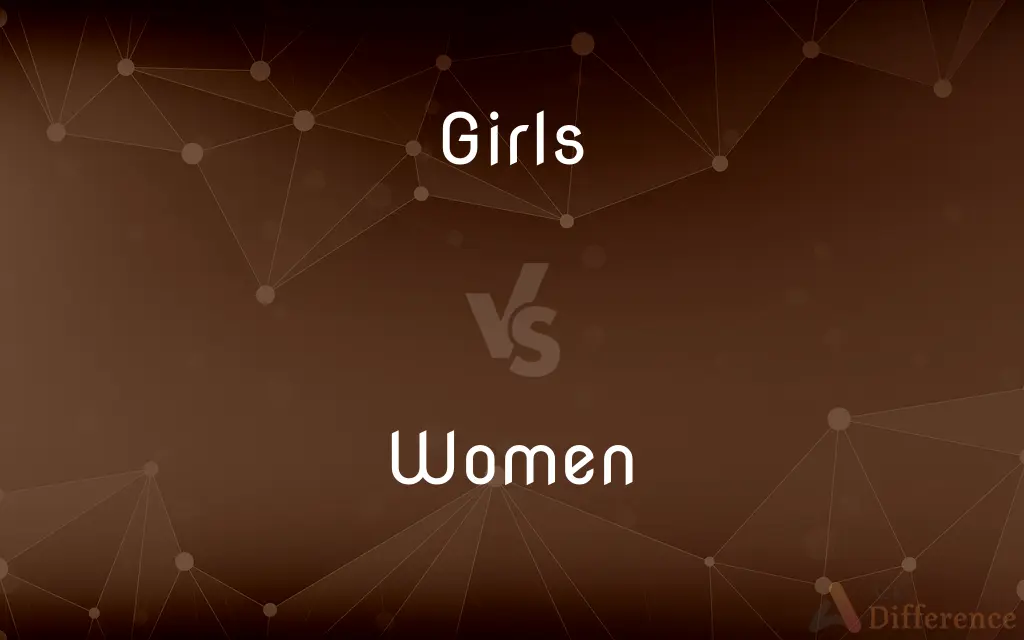Girls vs. Women — What's the Difference?
By Fiza Rafique & Urooj Arif — Updated on May 14, 2024
"Girls" refers to female children and adolescents, emphasizing youth and developmental stages, whereas "women" denotes adult females, highlighting maturity and adult responsibilities.

Difference Between Girls and Women
Table of Contents
ADVERTISEMENT
Key Differences
"Girls" typically denotes female individuals from birth until the end of adolescence, focusing on the developmental phases of childhood and teenage years. In contrast, "women" refers to adult females, generally from the age of 18 onwards, signifying a stage of maturity and greater independence.
Girls are often associated with learning and growth, experiencing educational and social development. Whereas women are frequently seen in contexts of work, family, and broader societal roles, reflecting their mature status and responsibilities.
In terms of legal and societal expectations, girls are usually under the guardianship of parents or legal guardians and have limited rights and responsibilities. On the other hand, women are considered legally independent, capable of making their own decisions and being fully accountable for their actions.
Culturally, girls are often depicted in relation to their family and educational settings, emphasizing their roles as daughters and students. Women, however, are portrayed across a broader spectrum of roles, including careers, motherhood, and leadership positions, reflecting their varied contributions to society.
Girls are typically in the process of forming their identities, exploring interests and potential paths for their future. Women, by comparison, are often viewed as having more established identities, with clearer understandings of their personal and professional lives.
ADVERTISEMENT
Comparison Chart
Age Range
Birth to adolescence (approx. 0-17 years)
Adult females (18 years and older)
Developmental Stage
Growth and development
Maturity and independence
Societal Roles
Students, daughters
Professionals, mothers, leaders
Legal Status
Under guardianship
Independent and fully responsible
Identity Formation
Forming identities
Established identities
Compare with Definitions
Girls
Individuals in the early stages of life.
The girls at the dance school are learning quickly.
Women
Independent entities in societal and legal contexts.
Women can own property and enter contracts independently.
Girls
Female children or adolescents.
The park was full of young girls playing.
Women
Mothers or potential mothers.
Women often balance careers and family life.
Girls
Minors in legal terms.
As girls under 18, they require parental consent.
Women
Individuals holding professional roles.
The conference features women leaders in technology.
Girls
Young female students.
The girls' soccer team won their school championship.
Women
Adult females, generally 18 years and older.
Women voters significantly influence elections.
Girls
Daughters within a family.
She has three girls and one boy.
Women
Figures of authority and experience.
She mentors young women in her community.
Girls
A female child.
Women
Plural of woman.
Girls
A daughter
Our youngest girl.
Girls
Often Offensive A woman.
Girls
A woman socializing with a group of women
A night out with the girls.
Girls
Used as a familiar form of address to express support of or camaraderie with a woman.
Girls
(Informal) A female sweetheart
Cadets escorting their girls to the ball.
Girls
(Offensive) A female servant or employee.
Girls
Plural of girl
Common Curiosities
How do societal expectations for girls differ from those for women?
Society expects girls to learn and develop, while women are expected to contribute significantly to society through work and family life.
How are the roles of girls and women different in society?
Girls are primarily seen as students and daughters, while women take on varied roles including professionals and mothers.
What are the developmental differences between girls and women?
Girls are in stages of physical and psychological development, whereas women have reached maturity.
How do educational needs differ between girls and women?
Girls' education focuses on foundational knowledge and skills, while women may pursue specialized and continuing education.
At what age does a girl become a woman?
A girl typically becomes a woman at 18, transitioning into legal adulthood.
How does the media represent girls and women differently?
Media often portrays girls in light of innocence and potential, whereas women are depicted with an emphasis on complexity and capability.
What legal rights do girls have compared to women?
Girls have limited legal rights, requiring parental consent for many decisions; women have full legal rights and responsibilities.
Why is the distinction between girls and women important?
The distinction recognizes different developmental stages and corresponding rights, responsibilities, and societal roles.
What defines a girl legally?
Legally, a girl is defined as a female under the age of 18 in most jurisdictions.
What challenges do girls face that are different from those faced by women?
Girls often deal with issues related to education and identity formation, while women face challenges in career advancement and work-life balance.
Can the term "girls" be used for adult females?
In casual contexts, "girls" can be used among adults informally, though it generally implies youth and inexperience.
Share Your Discovery

Previous Comparison
Hematopoiesis vs. Hemocytoblast
Next Comparison
Plane vs. PolygonAuthor Spotlight
Written by
Fiza RafiqueFiza Rafique is a skilled content writer at AskDifference.com, where she meticulously refines and enhances written pieces. Drawing from her vast editorial expertise, Fiza ensures clarity, accuracy, and precision in every article. Passionate about language, she continually seeks to elevate the quality of content for readers worldwide.
Co-written by
Urooj ArifUrooj is a skilled content writer at Ask Difference, known for her exceptional ability to simplify complex topics into engaging and informative content. With a passion for research and a flair for clear, concise writing, she consistently delivers articles that resonate with our diverse audience.
















































